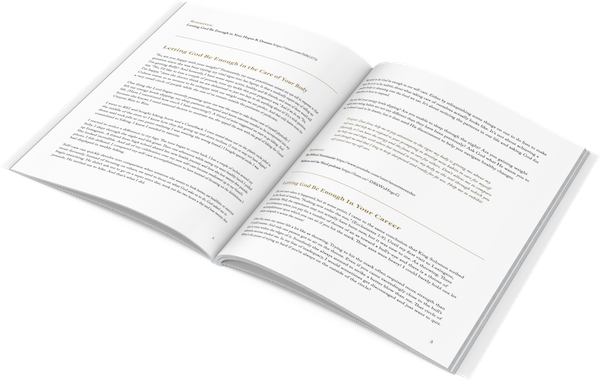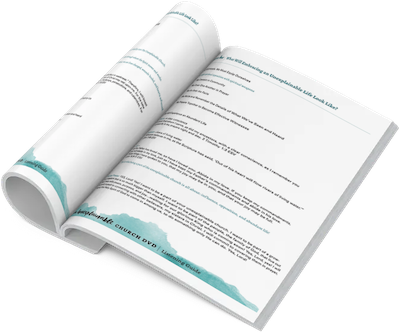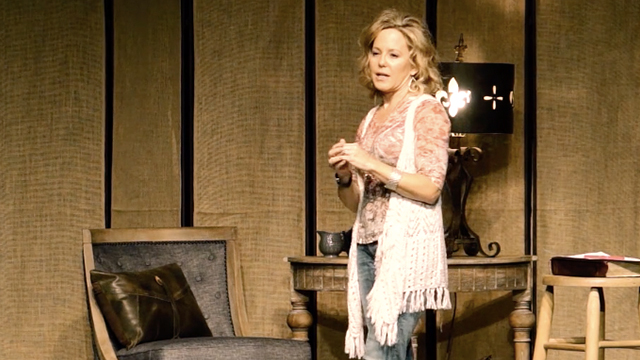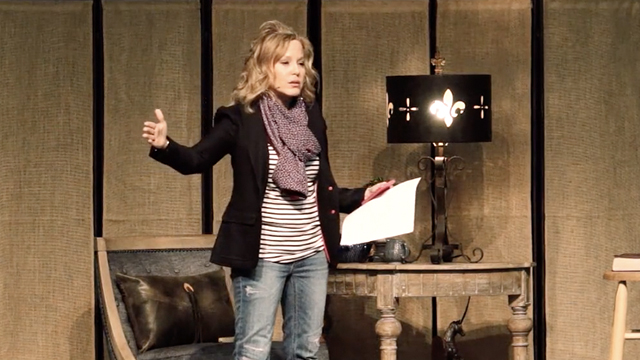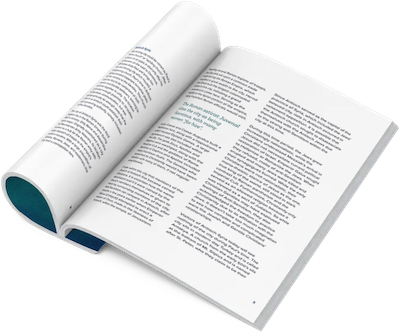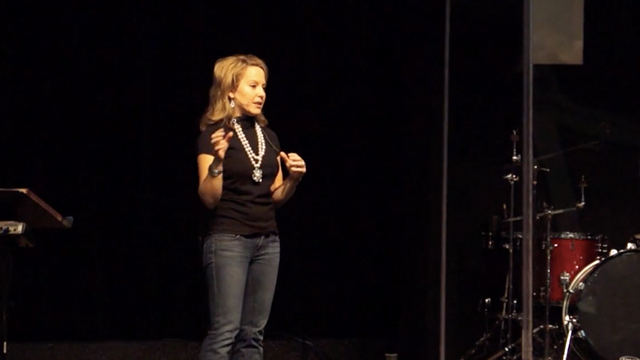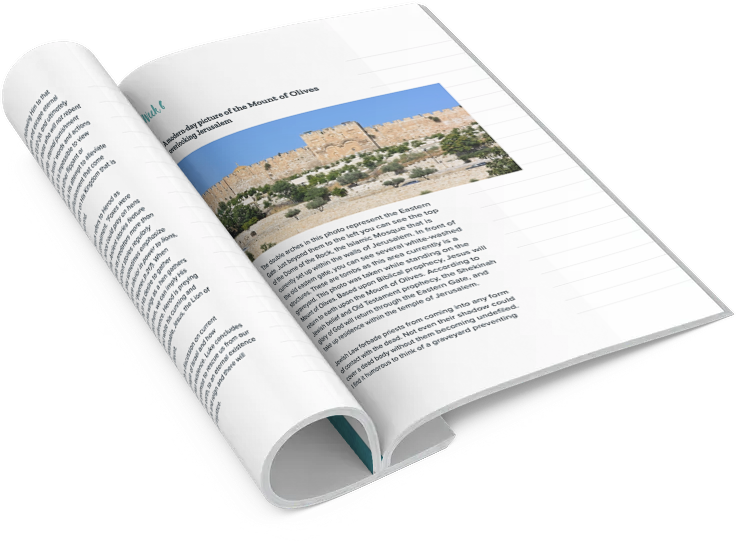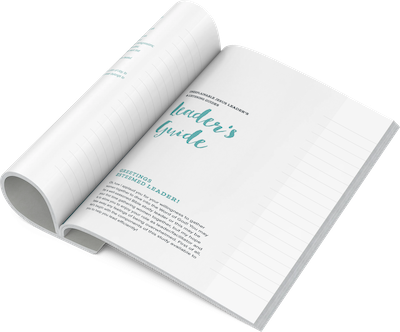Examples of contentment in the Bible aren’t hard to find. More accurately, the cries from people of God seeking contentment aren’t hard to find. Scriptures on contentment are aplenty and there are examples of men and women who discover contentment in God’s promises. Paul explained extensively the contentment he found in Christ.
- But how do those stories of contentment apply to today?
- Biblical heroes didn’t have Instagram.
- Our heroes of the faith didn’t have women’s health magazines on every register.
- There were no digital ad networks with companies telling us how unfulfilled we really are and how we need a specific product or experience to make us full.
You were meant for contentment. Yes, we are broken vessels because of sin in this world. But you are still a creation from the heart of an almighty God and that God does not make mistakes. There is no void that our God cannot fill.
Living with contentment is possible, but it’s not something you achieve, but rather a gift you receive.
How do you receive it?
How do you identify happiness vs contentment?
A Pathway to Contentment Anyone Can Follow
The Path to Contentment is a 21 day guide to develop the habit of gratitude. Four simple daily prompts inspired by the contentment path described by the Apostle Paul.

Do we need to read books on contentment or study verses on contentment, or stumble across quotes about contentment in order to finally unlock true contentment as described in the Bible?
If we fail to find the contentment we were created for, what dangers await? There is a whole lot more than wariness over a meaningless and doldrums life. We need to understand why discontent is so dangerous.
After spending years studying how God intentionally intersects Himself into the plight of the human condition, I believe there is a simple pathway that God laid out for contentment. In this article I will share with you the pathway I have decided to walk, how it has brought contentment, where the dangers have been, and how to lean on the power of the Holy Spirit and experience the rest that Jesus promises, waiting for you on the other side.
For more information on how to grow in contentment rather than staying stuck in disappointment, download your free Letting God Be Enough devotional here.
What Is Contentment According to the Bible?
Paul called contentment a “secret”. I find that an apt descriptor.
Like a deep, dark secret, contentment remains hidden for most of us even though we read about contentment in the Bible. Even for those of us who claim to have a relationship with God. We read lots of quotes on contentment. I came across one yesterday that read, “Be the kind of girl that trusts the heart of God so completely, she does not worry about the plans of God.” In other words, be content. No matter what.
I would like to know the secret to being able to do that. How about you?
What most fascinates me about Paul’s secret is that he wrote about contentment from a prison cell. The guy who traveled the world sharing the message of hope and salvation in Jesus Christ now sits cooped up unable to go anywhere. Yet he calls himself content. Clearly, contentment remains contrary to circumstances. He shared this secret, namely with the Philippian church, who questioned Paul’s contentment, God’s plans and why Paul remained imprisoned. Look at Paul’s response:
I have learned the secret of being content in any and every situation.
So how did Paul learn this secret? Most people chalk it up to the verse following this statement, but Paul’s key to contentment is actually explained in the verses beforehand.
He starts with a simple command: Rejoice! It is an action one chooses. Paul commands the discouraged Philippians to rejoice, or to be grateful for what God has done for them. There is a strong tie between gratitude and contentment. So the first step in achieving contentment is to recount one’s blessings and to focus on what God has already done in your life.
Paul continues with the importance of gratitude. Do not be anxious about anything, but in every situation, by prayer and petition, with thanksgiving, present your requests to God. After thanking God for what He has already done, then present what you still lack before Him, with further thanksgiving. Again, Paul speaks in the imperative tense, emphasizing that these attitudes are of one’s choosing, and a reasonable course of action for those who have a relationship with God.
Contentment comes with recounting one’s blessings. Whatever we yet need, we openly ask God for it. We do so with thankfulness, trusting that our God of provision gives His children all that they need. He continues: “And the peace of God, which transcends all understanding, will guard your hearts and your minds in Christ Jesus”. A lack of contentment is a lack of peace. And peace guards our heart.
Let’s break that down a bit.
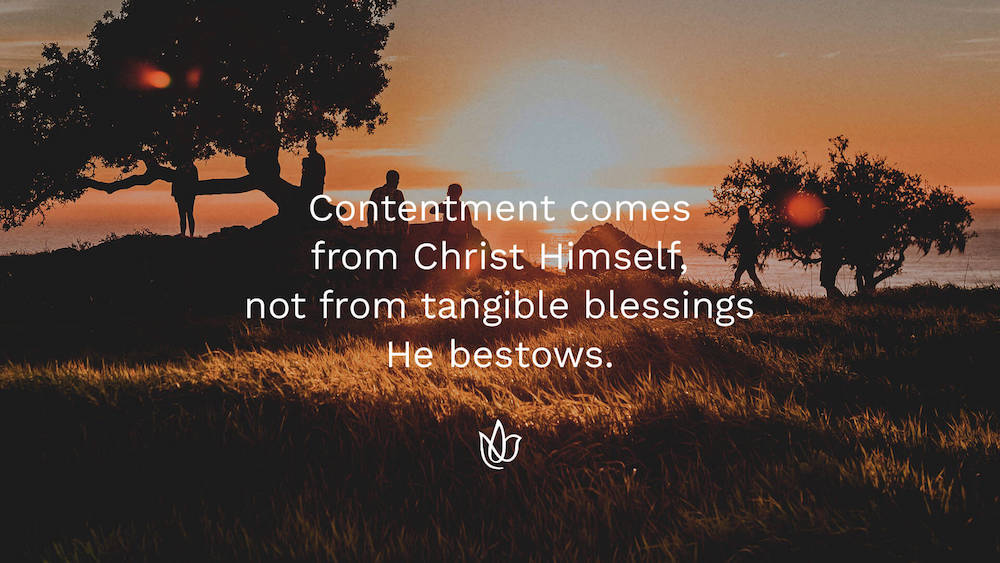
Peace, according to Jewish thought at the time of Paul came about not by human endeavor but was a gift of God. Something graciously granted by Him due to His relationship with His people. In other words, as one pauses to pray and thank God for their blessings, God will most assuredly grant His gift of peace. Paul gives a promise to us here– a guarantee of contentment, if you will. And prayers of thankfulness along with our requests open the door to receive it.
That Greek word “guard” Paul uses is “phrourureo” and it actually means “to hold prisoner”. Remember where Paul sits while penning this letter? In a Roman prison cell. With no means of escape. And he in essence says, “When you pause to praise God for what He has done in your life, then present all that worries you before Him in thanksgiving for His wisdom in what He provides and His power in bestowing it upon your life, God will most definitely give you peace. And He will prevent your mind from escaping into destructive thoughts and your heart from damaging emotions. He will hold our hearts and minds prisoner from being derailed by discontent.
An additional meaning for the Greek word “guard” is to keep silent. In other words, God will still and silence our racing minds and those emotions that trigger us into feelings of discontent.
Those are some great promises for contentment!
Paul insists that the believer in the death and resurrection of Christ is meant for contentment. Paul does not leave us wondering how to discern if our thoughts have somehow managed to escape. He gives a list to filter our thoughts through so if we have somehow managed to escape, we can go back to the beginning and rejoice, thank, and request again.
“…whatever is true, whatever is noble, whatever is right, whatever is pure, whatever is lovely, whatever is admirable—if anything is excellent or praiseworthy—think about such things”.
Herein are the thoughts one thinks when their mind remains guarded. When our mind races toward discontent, dissatisfaction, doubt and grumbling, Paul says we must pause and make the choice to rejoice.
Contentment Versus Happiness
Modern dictionaries deem contentment to be synonymous with happiness. Psychologists define three levels of happiness. Let’s compare these levels with what the Bible teaches us about contentment.
Momentary Happiness
The first, or lowest level of happiness, constitutes momentary feelings of joy or pleasure. Some examples might include, eating our favorite meal, partaking in a hobby we enjoy, listening to music we like or being intimate with someone. This level of happiness remains entirely situational and does not last long. When the meal is over or the music stops, the feelings of happiness end also.
Inner Happiness
The second level of happiness involves contemplation or inner reflection. We assess what makes us happy, when we feel happiest, our current level of happiness along with a comparative analysis of our level of happiness at previous times. When we ask ourselves, “Am I happy?” or “What would make me happy?” we engage at this level. Comparisons are also made between ourselves and the amount of happiness we perceive others to be enjoying.
Fulfillment Happiness
Psychologists define the highest level of happiness involves engaging in a higher meaning of life, or fulfilling one’s purpose. It involves pursuing something beyond one’s own pleasure. People at this level feel their life holds greater meaning and their daily choices remain in alignment with their deepest values. This prevents them from having inner conflicts and therefore, greater happiness.
Levels of Happiness Found In Scripture
Do we see these levels of happiness mentioned in the Bible?
When soldiers asked John the Baptist how to prepare themselves for God’s kingdom, one of his admonitions included, “Be content with your pay”. In other words, do not merely seek pleasure through the acquisition of tangible things or momentary experiences. He refers to level one happiness here. He invites people to temporarily set aside this lowest level of happiness to pursue the highest level. He equates living for the kingdom of God as this highest level, a lasting contentment that far outweighs fleeting moments of physical pleasure.
The writer of Hebrews discusses the second level of happiness.
He implores his readers, “Keep your lives free from the love of money and be content with what you have, because God has said, “Never will I leave you; never will I forsake you.” (Hebrews 13:5). In other words, a person who loves money muses to himself, “If I only owned that car, I would be happy,” or “Imagine how much happiness my family would experience on that vacation, in that home, or owning that boat”. They view money as the means to contentment, because once they obtain something acquired through their wealth, they will feel happy.
The superlative to this conditional happiness, according to the Bible, is the unconditional presence of God in one’s life. When we couple this teaching with Paul’s secret, we see that the contentment or happiness brought to us through the presence of God remains immediately accessible to us at all times and unable to be taken from us except by our own dismissal of its reality within our lives. We choose to either disbelieve it or lose focus of the fact that God remains with us, guarding us, when we intentionally seek Him. The Bible offers a more reliable means of attaining this second level of happiness– focusing on the continual presence and protection of God in our lives.
The highest level of happiness, which equates to living for something greater than oneself, is the happiness most profoundly discussed in Scripture. Jesus referred to this cause as the Kingdom of God and Paul lays out in his letters the specifics of how a person who lives for the Kingdom thinks and behaves.
According to the Bible, this is where our deepest happiness is found. This is Paul’s secret to contentment: he becomes able to rise above the temporal in pursuit of the eternal. “I know what it is to be in need, and I know what it is to have plenty. I have learned the secret of being content in any and every situation, whether well fed or hungry, whether living in plenty or in want.” (Philippians 4:12). Paul pursues an eternal pleasure involving all three levels of happiness and refuses to become derailed by discontent.
The Chief End of Man
Nearly five hundred years ago, John Knox penned the Scottish Catechism which included his famous quote: “The chief end of man is to glorify God and enjoy Him forever”.
Within this teaching, Knox embodies all three levels of happiness.
To glorify God means to show others who God is and what He is like. It assigns a deeper cause and higher meaning to your life. In this pursuit, Knox includes the natural outflow of the two lower levels of happiness. There will be a natural enjoyment that comes from this pursuit which results in feelings of happiness, which includes level one.
Contrary to what the world would teach us regarding happiness; Kingdom life does not force us to forego happiness. A life pursuing the Kingdom actually ensures it. And unlike the acquisition of tangible objects which remain conditional, removable, and revocable to our possession, members of the kingdom possess access to all three levels of happiness eternally.

Contentment Does Not Mean…
The world equates contentment with complacency. Maybe even boredom. A lack of thrill or adventure. Or possibly even laziness. According to the world, an ecstatic moment outweighs a life of contentment. This quote on contentment expresses this attitude:
Yet better for one of my nature to have it that way than to have life a peaceful, placid flow of quiet contentment. I must have days of rushing excitement.
Read more at https://www.brainyquote.com/topics/contentment-quotes
In one of my favorite movies, Shelby, played by Julia Roberts, implores her mother to allow her to take a great risk and pines, “Oh mama, don’t you know? I would rather have five minutes of wonderful than a whole life of nothin’ special!”. Most of us can relate to that sentiment. We want life to matter. But do we find contentment in chasing the next thrill? Do ecstatic moments equate to a life of significance?
Here is another quote indicative of the world’s thinking:
I don’t think I’m alone in this: I’m obsessed with trying to not only be happy but maintain happiness, but my definition of happiness is skewed more towards ecstasy rather than contentment.
Both of these definitions involve conditional contentment and circumstantial happiness.
Such contentment comes from a physical response within my body. It discounts the soul. If I experience the ecstasy of heroin, yet inwardly know I am destroying my body and my relationships, can this be classified as happiness?
The world’s definition contradicts itself in the prioritization of the physical over the emotional, relational or spiritual. We cannot remove happiness from the hierarchy previously posed. If something brings me happiness at the lower level, yet destroys the possibility of happiness at a higher level, it cannot be defined as happiness, and will ultimately breed discontent.
Why?
Because the highest level of happiness must coincide with what we value most and it must be something beyond ourselves and our own pleasure. No wonder those who chase physical pleasure in the pursuit of happiness cannot ever seem to find it!
When Shelby says she wants something wonderful, she refers to something beyond herself. She speaks of her desire to marry and bear children. To a higher cause than her own self. She seeks legacy through a child. She is not talking about a fleeting moment of physical pleasure.
Characters In the Bible From Whom We Can Learn Contentment
Paul informs the Philippian church regarding his secret to contentment: I have learned the secret of being content. He then says, “Whatever you have learned from me, put it into practice.” What does Paul imply to those receiving his letter? You have learned the secret to contentment also! Therefore put it into practice.
Paul previously outlined three steps to learn contentment.
- Praise and prayer. He implored the people to rejoice and present their requests to God.
- Purposeful thinking
- Practice this pattern
Paul followed his command to present their requests to God with purposeful thinking. We cannot just stop thinking negatively, we have to choose to think new thoughts. Again, Paul emphasizes that we have a choice in this. Let’s walk through these thoughts and why they would lead to contentment:
“…whatever is true, whatever is honorable, whatever is just, whatever is pure, whatever is lovely, whatever is commendable, if there is any excellence, if there is anything worthy of praise, think about these things”. (Philippians 4:8).
Here are some questions to ask ourselves:
Are my perceptions about that person true?
Are my thoughts toward that person noble or honorable?
Are my thoughts pure or are they negative or harmful toward others?
Is my attitude lovely?
Would those closest to me consider my attitude commendable or admirable?
Am I focused on excellence or finding out where everyone else is falling short? Am I being critical?
Or am I focused on my own foibles rather than God’s promises of sufficiency?
More often than not, we are so used to our thought patterns, we are not even aware of how they influence us, leading to emotions of despair, discontent and dissatisfaction. Paul teaches us that the secret to contentment is to pray through these negative thoughts and then replace them with positive ones.
But Paul insists that it is not a one time decision and then we naturally notice our negative thinking and immediately begin transposing our anxious, jealous and disparate thoughts with contented sentiments.
He says it takes practice. This is where he takes the readers of his letter next.
He says, “What you have learned and received and heard and seen in me—practice these things, and the God of peace will be with you”. (Philippians 4:9).
We need to practice. Praise and pray, pursue purposeful thinking and then practice this pattern. Then, instead of defaulting into discontent, we can stop the cycle before it starts. We can develop a habit of contentment.
Putting Paul’s Instruction Into Practice
Let’s pause here for a moment and put into practice Paul’s purposeful thinking he outlined for us. It might sound something like this:
Father, I feel like that person thinks less of me and intentionally makes me feel small. But maybe those feelings are not actually true. What I know to be true is that I am loved by You. That You made me on purpose and for a purpose. That in Your eyes, God, I am enough. Your love for me is not based on my performance or acceptance by others. You love me just as I am, even in my weakness.
Father, I am so critical and their behavior makes me so angry. I admit that I wish bad things for them sometimes. Forgive me for taking on the role of God in their lives. What I know to be noble and honorable is that You are a God of justice and mercy. You are the God who will right every wrong in the end. You are creating a place for me where there is no more crying or pain. I am not the Holy Spirit in that person’s life. I cannot control their behavior or change their attitude. Only You can, God. And I trust Your will and Your way in their life and in mine.
Forgive me when I cannot see past my hurt and only want them to experience harm. I am grateful that you do not treat any of us as our sins deserve, but You offer Your forgiveness toward all of us. You gave freely, while it cost You everything. Help me to remember that every one of Your creatures must answer to You and You alone. God, You are the Righteous Judge and also our Merciful Father. Help me to release this person over to You.
Father, I confess that my attitude is often unlovable or ugly. I throw pity parties. I see them in bitterness. I breed resentment. The inside of my heart is dark. I desperately need the light of your love to come and shine on these dark places. You are light and have overcome the darkness.
Your love is greater than all of my unloveliness.
Your beauty is greater than all of my ugliness.
You have given me a new heart and a new mind and the Holy Spirit to remake me from the inside out.
You are my Healer.I thank you that You can change my attitude and transform me making me more like Jesus. You never leave us as we are, but You continually transform us and make us new.
I love when the Psalmist says, “How excellent are your ways”. All You do is perfect and purposeful. You are at work in my heart and in my life. You are at work in those around me. You are love and all Your ways are loving. You are with me always, even when I feel alone or afraid. You are worthy of all praise for You are perfect.
Now, take a deep breath. Do you feel greater contentment after focusing on what is true, honorable and pure? Does your heart feel lighter?
Paul says the God of peace is with us. Can you feel Him? Paul insists we practice this over and over, whenever we feel discontentment developing in our minds.
The more we practice it, the more we can rest in the LORD’s peace.
Rising Above Circumstances to Find Contentment
Notice what happens when we put this into practice repeatedly? We become able to rise above our circumstances.
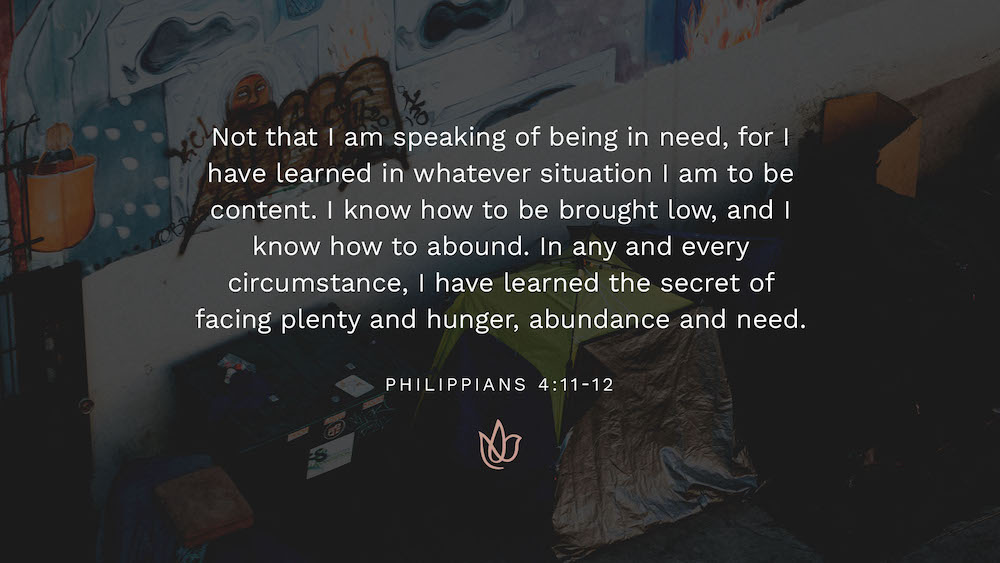
Look at what Paul says next: “Not that I am speaking of being in need, for I have learned in whatever situation I am to be content. I know how to be brought low, and I know how to abound. In any and every circumstance, I have learned the secret of facing plenty and hunger, abundance and need”. (Philippians 4:11-12).
Paul insists that a natural outpouring of this practice results in an indifference toward his circumstances. He remains content no matter what!
I know many people who have a gratitude journal. That is a wonderful start. Paul tells us to Rejoice at the very beginning of this lesson, which is exactly what one does when scribing their blessings.
But Paul insists we take it further.
We must be honest with God regarding the places of discontent in our lives. Even when we feel guilty over those feelings or ashamed that we harbor such thoughts and emotions. We must pour them out before God, expressing our need for forgiveness.
When we stuff them, they consume us and those thoughts become dictators instead of indicators that something is wrong inside of us. They control our emotions, leading to destructive decision making and unhealthy cycles of human interaction. Furthering our discontent.
We cannot write down our blessings and stop, we need to keep going. Pour out our anxiety and worry. Toss those toxic thoughts over to God thanking Him that He is big enough to handle our humanness! Then move on toward purposeful thinking as he lays out for us in Philippians 4:8.
Practice this over and over until it becomes a habit. Until our thoughts become placed before God the moment we begin to think them.
This is Paul’s secret.
For more information on how to grow in contentment rather than staying stuck in disappointment, download your free Letting God Be Enough devotional here.

And once this pattern becomes developed in our lives, we have a beautiful promise that many of us like to claim without putting Paul’s prescription into practice: I can do all things through him who strengthens me. (Philippians 4:13).
How often have we heard this verse quoted as a resignation toward contentment? And we wonder why we have such a hard time believing it and an even harder time living it out. It is because we have skipped the treatment plan for our discontent and tried to claim this promise at the end.
This ability to remain content and endure all things comes after putting Paul’s plan for contentment into practice. We cannot remove this promise out of context of where it was placed. The promise comes as a result of the practice. The praise, prayer, purposeful thinking and the practice of this prescription over and over in a person’s life.
Does Contentment Last Forever?
If contentment is predicated upon these practices Paul outlined to the Philippian believers and therefore subsequently, us, then contentment remains conditional.
In our flesh we will remain malcontent. Our only remedy is to imitate these practices of Paul systematically laid out for us. All habits must be maintained. They can become neglected and broken if not intentionally pursued.
However, we have the promise of eternal contentment after death for those of us who have put our faith and trust in the death and resurrection of Jesus Christ. He redeems our flesh and our spirit removing from us the stain of sin and discontent.
While on earth, we recognize our war against the flesh and its desires. Our flesh, corrupted by sin, remains restless and insatiable. Paul’s plan to teach us the secret of contentment involves denying the desires of the flesh in order to be led by the Holy Spirit within us. This is how we align ourselves in unity with God.
The Root of Discontentment
Discontent comes when our earthly corrupted desires war against the perfect Holy Spirit within us. Our souls were not created to dwell within sinful flesh. We were created to live in total alignment with the will of God, serving Him with all of our heart, soul, mind and strength. In other words, with a perfected body. One that awaits us when Jesus returns, and He sets up a new heaven and earth and glorifies our bodies.
As we wait for that day, we experience moments of discontent, while holding the ability to find contentment in Christ available to us at any moment, should we pursue it. Now that His Spirit has been deposited into us as our guarantee of things to come, contentment becomes possible.
Paul explains: And those who belong to Christ Jesus have crucified the flesh with its passions and desires. (Galatians 5:24)
So as we pine away for moments of pleasure, or long for tangible possessions, what shall we do?
Paul says to rejoice in what we have already been given. Pray through those desires that batter your mind, thanking God for His perfect provision and then intentionally pursue purposeful thoughts, putting those desires into proper perspective. And remember, we wait for the day when our Savior returns, our hope and contentment, Who will never be taken from us!
Why does Paul so emphatically implore us as believers to practice this pattern of finding contentment in our lives? Is it simply so we experience a better life? No. It is because defaulting into discontent is dangerous. Even deadly.
Extramarital affairs begin because a spouse is discontent with their emotional connection to their spouse.
Pornography addictions develop because people are discontent with their sexual experience with their spouse.
Alcoholism occurs because people are discontent with their relationships or circumstances, seek a remedy for their anxiety or worry, and need to be numbed in order to sleep.
Discontent becomes the dagger through our heart by which our enemy destroys us. He entices us to seek alternative methods of contentment. He tempts us to believe that moments of physical pleasure will offer the remedy for our restlessness. That something tangible can tame our wild heart.
But it can only offer a fleeting moment of pleasure, leaving our heart bleeding with even greater discontent because the satisfaction did not last.
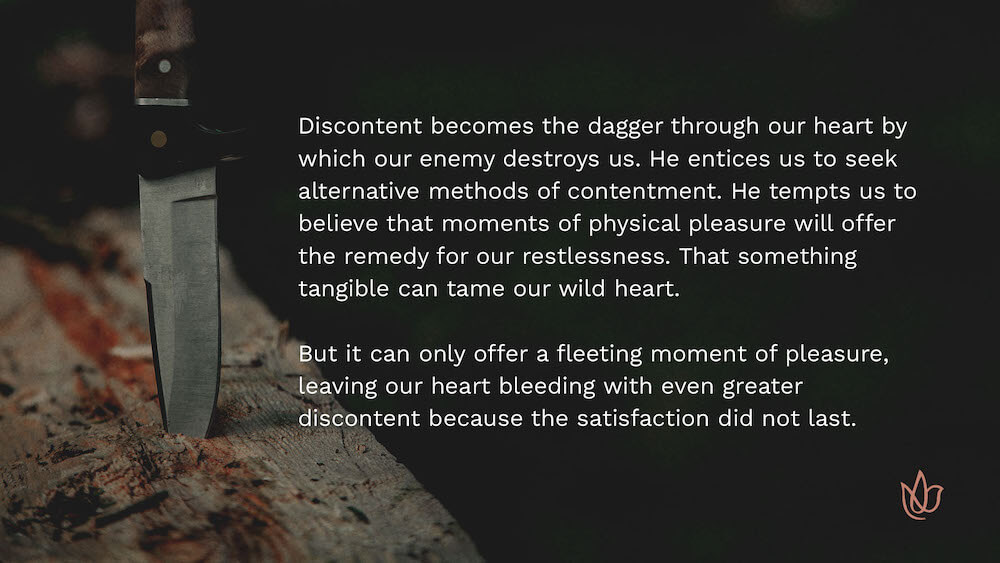
Content with Distastefulness of Turkish Delight
I remember reading The Chronicles of Narnia by CS Lewis as a child. The evil Snow Queen offered Edmund bits of Turkish Delight when he would do her bidding.
The Snow Queen represents evil, though she was stunningly beautiful in appearance.
Edmund did anything to receive those tasty treats, becoming enslaved to the ruthless, manipulative monarch.
I remember traveling to Turkey some thirty years later and tasting Turkish Delight for myself for the first time. I am convinced CS Lewis used great irony in choosing this candy for the method the enemy of our soul would use to ensnare us. There is nothing even remotely delightful about Turkish Delight and no one would choose something so distasteful.

Such is the enticement the evil one brings to our lives. Something appears stunningly able to satisfy us only to discover it is actually exceedingly distasteful and destructive.
Addictions, affairs, workaholism, anger, abuse, apathy: all symptoms of the disease of discontent. Notice what Paul warned Timothy only a few years after writing the need to pursue contentment:
But understand this, that in the last days there will come times of difficulty. For people will be lovers of self, lovers of money, proud, arrogant, abusive, disobedient to their parents, ungrateful, unholy, heartless, unappeasable, slanderous, without self-control, brutal, not loving good, treacherous, reckless, swollen with conceit, lovers of pleasure, rather than lovers of God (2 Timothy 3:1-4).
How could we describe these people in a single word? Discontent.
Similarly, look at what John warns. Do not love the world or the things in the world. If anyone loves the world, the love of the Father is not in him. For all that is in the world– the desires of the flesh and the desires of the eyes and pride of life– is not from the Father but is from the world. And the world is passing away along with its desires, but whoever does the will of God abides forever. (I John 2:15-17).
One of the reasons I believe we are seeing a huge deconstruction movement in the church is due to discontent.
We put our faith in Jesus and thought we signed up for something bigger than ourselves. Something that would bring our lives meaning and satisfaction. But when we continue to struggle with discontent we decide the Bible must not be true, faith must be fallacious, and we must seek something else to satiate our longing hearts.
But if we carefully examine Scripture we discover the real source of our discontent. It lies within us. It is the sin nature that continues to distract, disturb and reign, rather than the presence of Christ. We do not practice the pattern of contentment Paul laid out for us in Scripture yet complain that we continue to remain dissatisfied.
If we desire contentment, we must seek it through God’s prescriptive.
Rejoice, request and remain in His peace.
Practice gratitude, pour out the areas of discontent in our lives before Him, and purposefully choose the godly perspectives prescribed for us in Philippians 4:8.
In this pattern of living we are promised the peace of God that will surely guard us. We will acquire discernment to see Turkish Delight as the distasteful substitute that can never satisfy and not allow the enemy to dupe us into believing he has something to offer.
Additional Scripture On Contentment
While Paul deals with contentment on a more over–arching level in his letters to the Philippians, he gets specific about it in his letter to Timothy.
We struggle with contentment when we long for a tangible object we do not possess. Specifically something we can purchase or someone we must pursue.
It might be the person who has a poster of their dream car pinned up in their garage and they remain discontent until it actually becomes parked there. Or it could be the person who strives to finish their degree waiting for the letters to appear behind their name they so ardently desire. It could be something as small as a fishing pole or a new sofa. It could be the person two cubicles down the aisle at work.
But it goes deeper than that.
There is an inner belief that bombards the soul and clouds contentment. There is a creed on which one places their confidence to find contentment: God alone will never be enough to satisfy me. I must also have something else. Without it I can never be happy.
Paul refers to people with the belief that “godliness is a means of gain” as “depraved in mind and deprived of truth” (1 Timothy 6:5).
Their thinking goes something like this: I follow God because then He will bless me with tangible blessings and it is through these blessings that my contentment will come.
Paul sees this as utter foolishness and a complete misconstruction of the gospel message. Contentment comes from fellowship with Christ, from being made right with Him and the ability to be in His presence. Not from the tangible blessings He bestows upon us.
Paul contrasts this with the following truth: godliness with contentment is great gain. (1 Timothy 6:6). He further explains: “Those who desire to be rich fall into temptation, into a snare, into many senseless and harmful desires that plunge people into ruin and destruction. For the love of money is the root of all kinds of evils. It is through this craving that some have wandered away from the faith and pierced themselves with many pangs,” (1 Timothy 6:9-10). Paul warns Timothy to flee from these things.
Contentment comes from Christ Himself, not from tangible blessings He bestows.
Paul also explains the dichotomy of contentment and how it is antithetical to both circumstances and possessions.
When the Corinthian church questioned Paul’s relationship with Christ and his call to be an apostle, Paul let them know that he did not find contentment through their acceptance nor their approval. He found it in His relationship with Christ.
The Corinthians adopted the philosophy that Paul warned Timothy about. They somehow believed that if one was truly godly, then they would experience material and societal gain, bringing them acceptance, approval and contentment.
But Paul argues the opposite:
For the sake of Christ, then, I am content with weaknesses, insults, hardships, persecutions, and calamities. For when I am weak, then I am strong. (2 Corinthians 12:10)
Because contentment comes from the presence of Christ, Paul argues that it may actually be through difficult circumstances that one experiences the greatest contentment. Because through difficulty, one becomes most acutely aware of the presence of Christ in their life. They experience that gift of peace that Paul promised when we pour out our worries and discontent to God, thanking Him for His care and provision that we cannot always see, but yet choose to trust.
For more information on how to grow in contentment rather than staying stuck in disappointment, download your free Letting God Be Enough devotional here.
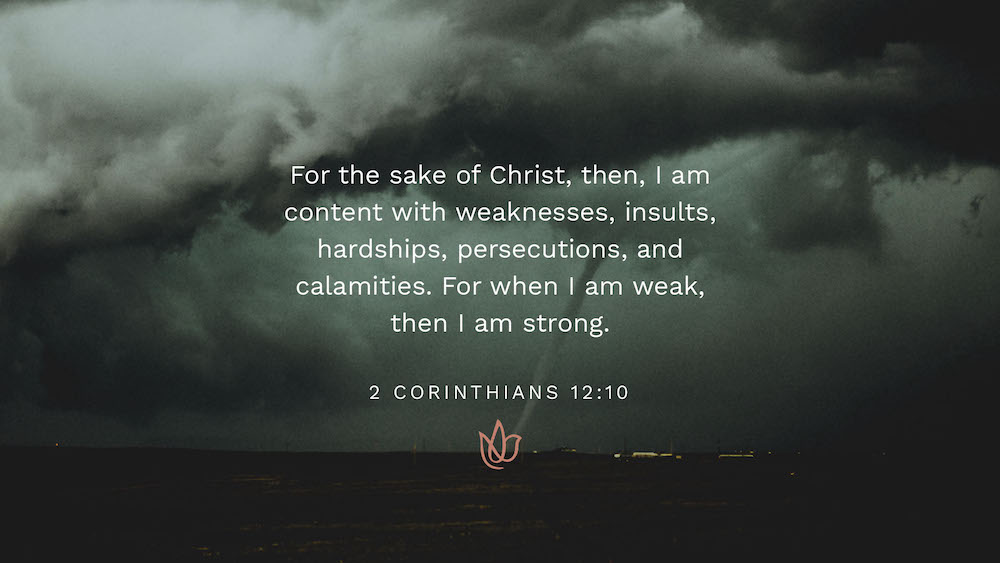
The unexplainable arrival at contentment does not come from a change in circumstances, but rather a change in us. And Paul argues, the Holy Spirit often hammers our heart through hardship into a vessel full of peace.
The writer of Hebrews echoes this idea of contentment coming solely through the presence of Christ in our lives.
Keep your life free from love of money, and be content with what you have, for he has said, “I will never leave you nor forsake you.” Hebrews 13:5
We won’t find satisfaction in tangible things, it will only be God Himself who can satisfy us.
As CS Lewis said, “If I find in myself a desire which no experience in this world can satisfy, the most probable explanation is that I was made for another world.”
Christ Himself said, “I am not of this world” and that we, as His followers, “are not of the world, just as I (Jesus) am not of the world,” (John 17:16).
Our contentment cannot be found here. Not in an earthly person, place or a thing. Only in Christ. And when we practice the patterns Paul laid out for us, the peace of Christ, His very presence within us, guards our hearts and minds. And we become able to do all things, as He strengthens us. We overcome the discontent of the world.
Put Paul’s plan into practice and live a new pattern of peace in your life.
A Pathway to Contentment Anyone Can Follow
The Path to Contentment is a 21 day guide to develop the habit of gratitude. Four simple daily prompts inspired by the contentment path described by the Apostle Paul.

Would you like access to 3 Free Ebooks from Erica Wiggenhorn at Every Life Ministries? You can find The Busy Woman’s Guide to Connecting with God, The Busy Woman’s Guide to Praying for Friends and Family and What Jesus Wants Women to Know About God in our Busy Women’s Bundle.
Learn the Secrets to Slowing Down 
Women of faith were not designed to lead frantic, overly-committed lives. We have been intricately designed for rest, and connection with the Lord.
God desires you to feel close to Him – to experience His presence and sense His guidance. He delights to see you walk confidently through life because you know He is with you and for you.
I’d like to invite you to slow down and learn how to prioritize what matters most in your life. Get Your 3 Free Ebooks Now!

